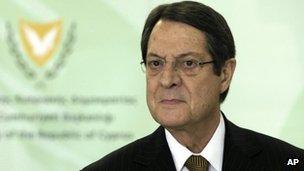Eurozone confident on Cyprus bailout
- Published

New President Nicos Anastasiades has promised to secure a bailout
Eurozone finance ministers, known collectively as the Eurogroup, are confident of agreeing a bailout for Cyprus by the end of March.
The bailout could be worth up to 17bn euros ($22bn; £15bn).
Eurogroup head Jeroen Dijsselbloem said ministers were ready to help Cyprus, but the details still needed to be worked out.
Cyprus's new government has agreed to a review of how banks are implementing anti-money laundering laws, he said.
This is likely to appease Germany, which had raised concerns about money-laundering on the island.
"We agreed to target a political endorsement of the programme towards the second half of March," Mr Dijsselbloem said, referring to the rescue package.
EU Commissioner for Economic Affairs Olli Rehn hailed the breakthrough on money-laundering.
He had warned over the weekend that Cyprus leaving the eurozone remained a dangerous possibility.
"Even if you come from a big EU country, you should be aware that every member of the eurozone is systemically relevant," Mr Rehn was quoted as saying in Germany's Der Spiegel magazine.
"If Cyprus becomes disorderly insolvent, it is very likely that would lead to it exiting the eurozone."
'Bail-in'
Cyprus's newly elected President, Nicos Anastasiades, has promised to secure a financial bailout, saying his top priority is to restore the country's credibility.
Cyprus requested a bailout in June last year but the previous communist-led government was unable to reach an agreement.
Finance ministers from the 17 eurozone members held talks for about four hours on Monday, which largely focused on how to fund a potential rescue for the island.
In a statement, Eurogroup ministers, external welcomed "the commitment of President Anastasiades, reiterated by [Finance] Minister Sarris, to closely co-operate with Cyprus's European partners towards the earliest possible completion of the loan agreement."
Germany has pushed for depositors in Cypriot banks to help pay for the rescue, a process known as a "bail-in".
But Cyprus fears a bail-in could spark a withdrawal of funds from the country, making its economic situation worse.
President Anastasiades has already said that any suggestion of investors or bank depositors taking a "haircut" on their investments "is not accepted", a view shared by Cypriot Finance Minister Michalis Sarris.
The Eurogroup meeting was also expected to assess the rescues of Portugal and the Republic of Ireland, with the possibility that both countries will be given slightly longer to pay back the loans it has already received.
But Irish Finance Minister Michael Noonan said there was "no expectation of an offer being made to Ireland at this stage".
Bank bonuses
The talks will broaden out on Tuesday to include all 27 EU states.
The issue of bankers' bonuses could spark a lively debate after the EU agreed a provisional deal to cap bonuses at one year's salary, despite strong opposition from the UK, which hosts Europe's biggest financial services centre.
London argues the rules will drive away talent and restrict growth in the financial sector.
"We continue to have real concerns on the proposals. We are in discussions with other member states," a spokesman for Prime Minister David Cameron said on Monday.
Chancellor George Osborne is likely to argue for changes to soften the pay curbs although he cannot block the deal.